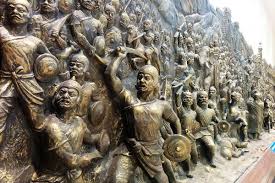On October 23, 2017, Union HRD Minister Prakash Javadekar mentioned that from the next academic session, ‘Paika Bidroha’ (Paika rebellion) of 1817 will included in history text books as ‘the First War of Independence’.
- Central Government under PM Narendra Modi has taken several initiatives to create awareness among Indians about the Paika rebellion.
- During his visit to Bhubanewar, Odisha in April 2017, Prime Minister Narendra felicitated the family members of 16 freedom fighters who were martyred during the Paika Rebellion.
- In July 2017, the then President Pranab Mukherjee inaugurated year-long celebration of Bi-Centenary of the Paika Bidroha of Odisha.
- Central Government has allocated Rs. 200 crore for commemorating it across the country.
About Paika Rebellion:
Paika Rebellion was an armed rebellion against British East India Company, which broke out in the year 1817 across Odisha. Combination of social-political-economic causes triggered the Paika rebellion.
- Paiks were the traditional warrior clan under Gajapati rulers of Odisha.
- Their ancestors were granted rent-free rights over land in Khurda region as recognition for their military service. After the defeat of King of Khurda at the hands of East India Company, the rights of Paiks over their ancestral land were derecognised by the British.
- Besides, owing to imposition of unreasonable taxes, the common people in the region too were not satisfied with the British officials.
- British officials also abolished a local currency system prevailing in the region which added to inconvenience of the masses.
- Paika rebellion broke out in the region under the leadership of Bakshi Jagabandhu Bidyadhara. British were able to re-establish their authority in the region after numerous conflicts and casualties.
- Many Scholars, researchers and historians consider Paika Rebellion of 1817 was India’s first organized armed rebellion against British Raj.
AffairsCloud Recommends Oliveboard Mock Test
AffairsCloud Ebook - Support Us to Grow
Govt Jobs by Category
Bank Jobs Notification